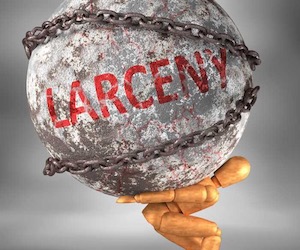What You Need to Know About Larceny Charges in NC
 If you have been charged with larceny in North Carolina, you are likely wondering what the consequences will be.
If you have been charged with larceny in North Carolina, you are likely wondering what the consequences will be.
Larceny is a serious crime, and can lead to long term consequences if you are convicted.
In this article, we will discuss the different types of larceny charges in North Carolina, and the potential consequences of a conviction.
We will also explain why it is important to hire a lawyer right away if you are charged with larceny.
What is Larceny? Larceny is a crime that involves the taking of someone else's property without their permission.
Larceny is a crime that involves the taking of someone else's property without their permission.
It's not a mistake.
It's an intentional act.
That means you mean or intend to do wrong.
You may have heard of that called the mens rea.
That's a Latin term that means "guilty mind."
So larceny is basically theft or stealing something. You intend to permanently deprive the alleged victim of the property involved.
That's true for both felony larceny charges and misdemeanor larceny.
Criminal Defense lawyers often refer to larceny as a "crime of dishonestly" or "moral turpitude."
In North Carolina, there are different classifications of larceny depending on the value of the property taken, the type of property that is stolen, and the circumstances of the individual fact pattern.
It's important you understand each case is different.
"What happened in your friend's felony larceny charges, and the associated criminal penalties, may not be at all applicable to your felony larceny charge."
- Cole Williams, Durham Defense lawyer
 There are certain types of larceny charges in North Carolina or theft crime that are considered a felony, even if the value is relatively minimal and mistakenly assumed a misdemeanor offense.
There are certain types of larceny charges in North Carolina or theft crime that are considered a felony, even if the value is relatively minimal and mistakenly assumed a misdemeanor offense.
There are also related criminal charges that involve the theft of property and things of value that can be indicted as a felony based on your relationship with the alleged victim.
For example, stealing from your employer or what is know as Larceny by Employee in NC, is a felony charge.
So is embezzlement.
Is Larceny in North Carolina a Felony or Misdemeanor?That's a great question that can be difficult to answer.
A lot depends on the nature and circumstances of the allegations and the individual aspects of your case and what you allegedly stole.
Certain theft crimes in NC are considered to be a misdemeanor, but can be charged as a felony if the value of the property taken is over $1,000.
The criminal law in North Carolina, N.C.G.S. 14-72, sets forth that larceny of goods (personal property) that are worth more than $1,000 is a Class H Felony.
On the other hand, the stolen property that is $1,000 or less, is a Class 1 Misdemeanor, which is still pretty serious.
But there are important exceptions.
When is Larceny a Felony?Even if the value of the stolen property is $1,000 or less, if you're accused of stealing any type of firearm, that's a felony in North Carolina.
The statute specifically defines other types of stolen goods that may change what you might think of as misdemeanor larceny to a felony.
For example, if you're accused of stealing an incendiary device or explosive device, that is classified as felony larceny.
North Carolina State Archives also can involve an indictment for felony larceny.
What are the Consequences of a Larceny Conviction?"Frankly, it's a pretty complicated area of law. We think it's a really good idea to talk to a lawyer if you've been charged with larceny in Durham."
- Cole Williams, Criminal Defense Attorney Durham NC
 A conviction for most theft crimes can have long-term consequences that you may not have thought of.
A conviction for most theft crimes can have long-term consequences that you may not have thought of.
In fact, the consequences outside of court can turn out to be more of a headache than getting arrested or charged in the first place.
"You do not want to be labeled a thief or someone not to be trusted. Your reputation matters. It's more than a little embarrassing. Just being accused of stealing is serious."
- Cole Williams, Criminal Defense Lawyer in Durham NC
A criminal record can make it difficult to find a job or housing. It can affect child custody and visitation. It can result in revocation of professional licenses.
Obviously, there is a social stigma associated with crimes of theft and dishonestly.
In court, punishments may include things like:
- The possibility of jail or prison time
- Probation
- Community Service
- Paying Back the Victim (restitution)
- Fines imposed by the Court
- Costs of Court
- Probation Supervision Fees
- Permanent Record - Inability to Purge or Expunge
 Again, larceny offenses can be different.
Again, larceny offenses can be different.
As you might imagine, the potential punishments for felony larceny are substantially more burdensome than misdemeanor larceny or other petty misdemeanors.
Indeed, if you're convicted of Larceny by Employee and the property (money, goods) is valued $100,000 that's a Class C Felony in North Carolina and requires a long active prison term.
To give some context, Armed Robbery in North Carolina is a Class D Felony.
Won't the Judge Dismiss the Charges if I Haven't Been in Trouble Before?The answer to this question is, "no."
You are not entitled to a dismissal if you have a clean record or have never been in trouble.
You are also not automatically entitled to a deferral or deferred prosecution just because this is your first offense.
 As part of its fact-finding responsibilities, your prior record is not generally a factor that the Court (the Judge) will consider when deciding whether or not you're guilty.
As part of its fact-finding responsibilities, your prior record is not generally a factor that the Court (the Judge) will consider when deciding whether or not you're guilty.
In fact, the person responsible for negotiating pleas and deciding whether to prosecute is the Assistant District Attorney assigned to the matter.
Despite what you may have been told, it's not up to the police officer or the detective. It's not up to the Judge whether to prosecute or not.
The North Carolina Larceny Laws are tough.
If you've been charged with larceny in NC, we think it is important to take the charge seriously and hire a criminal defense attorney right away.
Criminal defense attorneys explain the process, tell you what options are available to you, and help protect your legal rights.
Contact Durham Defense Lawyer Cole Williams today for a free consultation.
What Does Class H Felony Mean?Class H felonies are a type of felony in North Carolina and are punishable by up to 39 months in prison.
This classification includes crimes such as:
- Assault by Strangulation
- Habitual Misdemeanor Assault
- Obtaining Property by False Pretense (Less than $100,000)
- Entering or Breaking and Entering ("B & E") with the intent to commit a felony
- Fraudulently Setting Fire to a House (Dwelling Houses)
- Hit and Run Resulting in Injury
- Sale of Controlled Substance (Schedule II, IV, V, and VI)
- Possession with the Intent to Sell or Deliver or Manufacture Cocaine
- Prison Escape - State Prison
- Larceny of Property $1,000 value or more
If you have been charged with a Class H felony, get legal help from an experienced criminal defense attorney who can advise you of possible defenses, a possible sentence, and guide you towards the most appropriate manner in which to process.
Should I Talk to the Police or Give a Statement?This is a difficult question and one you should speak to your lawyer about before making any decisions.
"We generally recommend not giving a statement without first talking to a lawyer and establishing an attorney client relationship."
- Cole Williams, Durham Defense Lawyer
 It is important to know that anything you say to the police can be used against you in court.
It is important to know that anything you say to the police can be used against you in court.
If you choose to give a statement, it is important to be honest and truthful.
Lying to the police is a crime itself and can make your situation worse.
Take the Fifth - Miranda RightsYou have the right to remain silent.
This means that you do not have to answer any questions the police ask you.
You can simply tell them that you are exercising your right to remain silent and they will have to stop questioning you.
Again, it is best to speak with a lawyer before making any decisions about what to say or do.
They Didn't Read Me My Miranda Rights A very common misunderstanding of North Carolina law by people charged with different offenses is that police must read you your Miranda Rights.
A very common misunderstanding of North Carolina law by people charged with different offenses is that police must read you your Miranda Rights.
People assume, "If they don't read you your rights, the charges have to be dismissed."
That simply is not the case.
Miranda rights apply when you are in police custody and being interrogated.
In fact, if the officer didn't read you your Miranda warnings, it doesn't mean that anything you said can't be used against you.
It just means that the custodial interrogation cannot be used as evidence, if the Court finds as a matter of law your 5th Amendment Right has been violated.
Reading your rights is not required in each and every instance.
It is a complicated area of North Carolina law that deserves the attention of an experienced criminal lawyer.
Durham Criminal Defense Lawyer - Cole WilliamsWe help people with a wide range of criminal charges in Durham NC, including but not limited to things such as:
- Possession of Stolen Goods / Possessing Stolen Goods / Stolen Items
- Unlawful Concealment
- Misdemeanor Possession
- Property Theft
- First Offense Shoplifting Charge / Second Offense
- Theft of Motor Vehicle Parts
- Felony Larceny
- Embezzlement
- Larceny Crimes by an Employee
- Felony Possession
 Cole Williams Law Home
Cole Williams Law Home